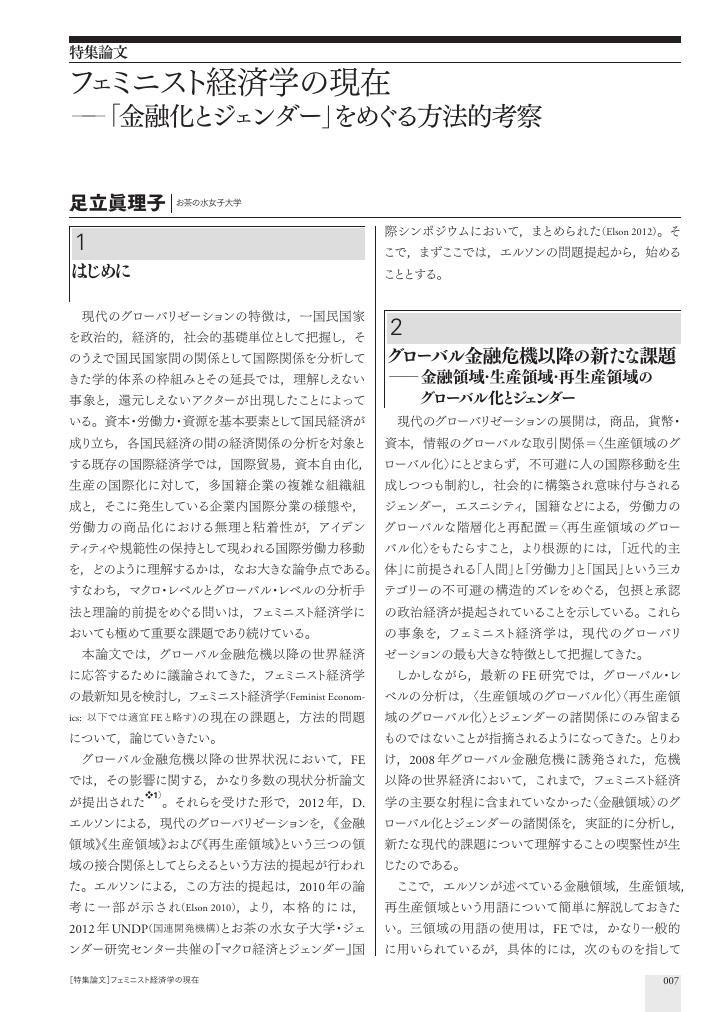- 著者
- 足立 眞理子
- 出版者
- 経済理論学会
- 雑誌
- 季刊経済理論 (ISSN:18825184)
- 巻号頁・発行日
- vol.50, no.2, pp.85-87, 2013-07-20 (Released:2017-04-25)
9 0 0 0 OA フェミニスト経済学の現在:「金融化とジェンダー」をめぐる方法的考察
- 著者
- 足立 眞理子
- 出版者
- 経済理論学会
- 雑誌
- 季刊経済理論 (ISSN:18825184)
- 巻号頁・発行日
- vol.53, no.3, pp.7, 2016 (Released:2018-10-09)
9 0 0 0 OA 女性と経済 : フェミニスト経済学のあゆみ
- 著者
- 足立 眞理子
- 出版者
- 大阪府立大学女性学センター
- 雑誌
- 女性学講演会 (ISSN:18821162)
- 巻号頁・発行日
- vol.16, pp.51-81, 2013-03
- 著者
- 足立 眞理子
- 出版者
- 経済理論学会
- 雑誌
- 季刊経済理論 (ISSN:18825184)
- 巻号頁・発行日
- vol.47, no.3, pp.6-21, 2010-10-20 (Released:2017-04-25)
- 被引用文献数
- 1
This paper takes a Marxist Feminist perspective to consider how the newly established field of Feminist Economics of the 1990s extended into labor theory. The debate on S. Himmelweit's 1995 extension of feminist economics to labor theory rested on three conditions defining the concept of labor: the generation of opportunity cost, the social division of labor, and third party substitution. According to Himmelweit, if all three conditions are present, one can define the situation as "labor." This serves as the basis of today's feminist economics. The debate, however, centers on the concept of "caring." The concept of caring is in itself a critique of the modernist dualist system of economics that poses "labor" against "non-labor." At the same time, only the concept of care contains the possibility of alienation from the concept of labor because the condition of third-party substitution is not necessarily satisfied. However, this method means simultaneously specified regardless of the criticism to capitalist market economy which the Marxist feminism mainly described. This argument takes the feminist concept of unpaid labor as socially necessary labor to social reproduction. Today we have reached a new concept of reproductive labor. But this concept was arrived at by cutting off the critique of the capitalist market economy which is the source of Marxist Feminist thought. The reason is because the concept of labor was influenced by the English Rubin School's interpretation of labor theory, which was the standard for Marxism in the West. In this paper I will newly elucidate the concept of labor by including the critique of the capitalist market economy which has long been the theme of Marxist Feminism. I do this by clarifying the points of difference in "value" of the labor force for Marx and the classical school's regular equilibrium theory, especially considering the contrast with Ricardo. And, as a response to questions raised by Marxist Feminism, I further argue that unlike classical economics which takes the family unit for its basis, the Marx model is non-converging, based on 'the individual and his/her own child' what one might call the 'single parent model.' I open the argument by a broad discussion of what the Uno School terms as 'muri' in the commodification of labor power in relation to the Marx model. That is, I clarify a theoretical contribution of Marxist feminism, the relative autonomy and articulation between the productive sphere and the reproductive sphere. That is, I argue that 'muri' exists not only in the commodification of labor, but also in the pre-commodification stage as well as in the stage after commodification. One could say that the theorization of history in Marxian analysis is analogous in value to feminist and gender analysis of contemporary globalization.
- 著者
- 足立 眞理子
- 出版者
- 経済学史学会
- 雑誌
- 経済学史研究 (ISSN:18803164)
- 巻号頁・発行日
- vol.60, no.2, pp.125-126, 2019 (Released:2019-10-14)
1 0 0 0 理論 偽装の貨幣--アンティゴネー間奏 (特集=家族とは何か)
1 0 0 0 グローバリゼーションとジェンダー (特集 グローバリゼーション)
1 0 0 0 IR 金融排除/包摂とジェンダー : 金融化された経済へのフェミニスト政治経済分析 (特集 グローバル金融危機以降のアジア経済社会とジェンダー : 金融領域・生産領域・再生産領域の接合)
- 著者
- 足立 眞理子 ADACHI Mariko
- 出版者
- お茶の水女子大学ジェンダー研究所
- 雑誌
- ジェンダー研究 = Journal of gender studies, Ochanomizu University : お茶の水女子大学ジェンダー研究所年報 (ISSN:13450638)
- 巻号頁・発行日
- no.19, pp.11-26, 2016-03


